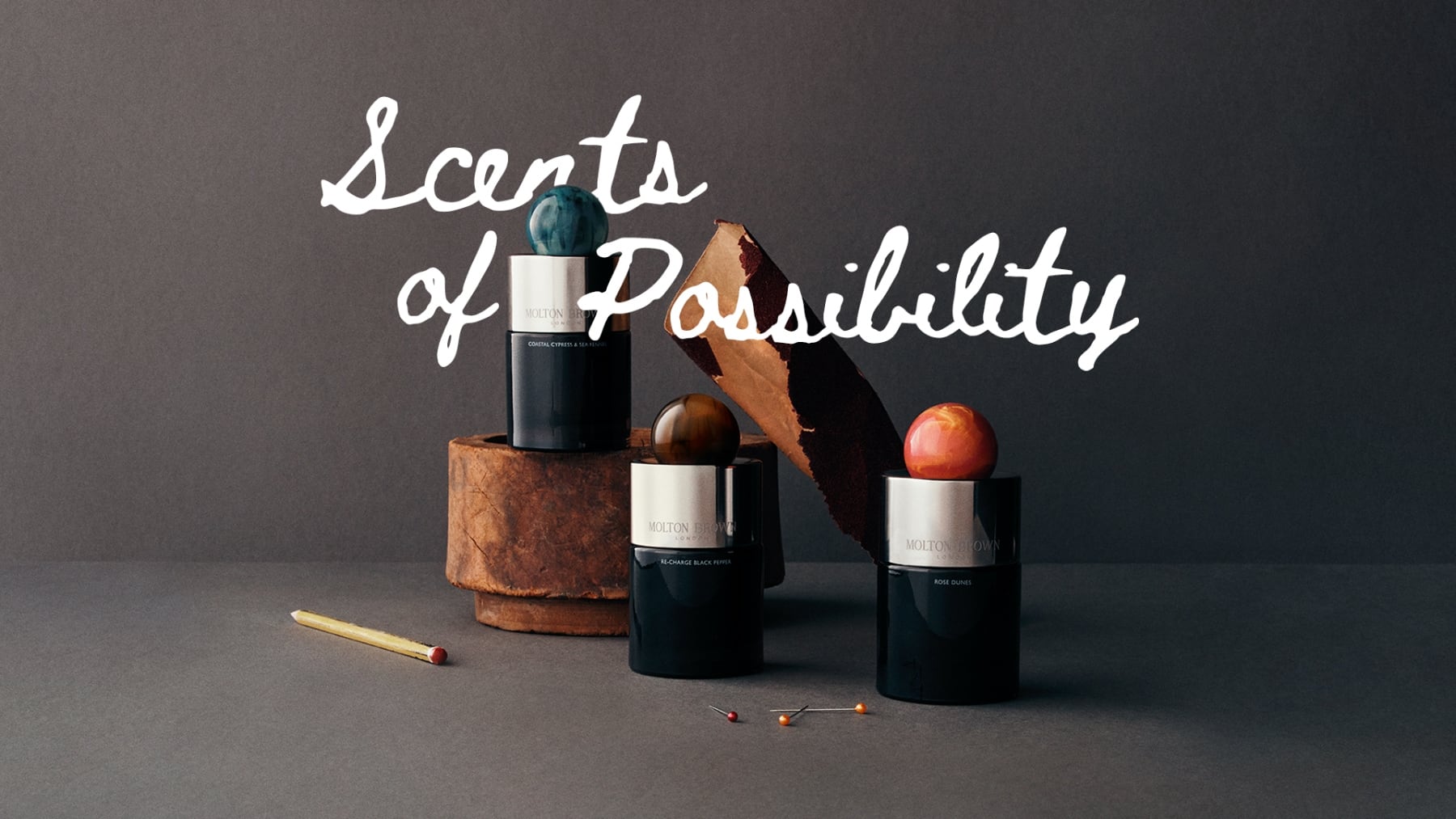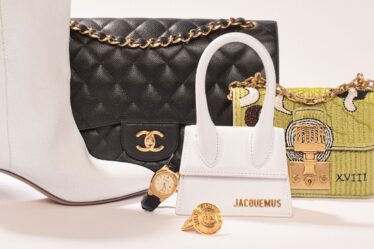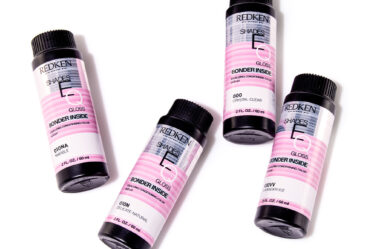
For many beauty companies, the always-popular fragrance category has been a valuable buffer against wider spending slowdowns.
British bath and body brand Molton Brown is hoping it can also jumpstart growth.
While best known for its premium shower gels and hand washes, Molton Brown launched fine fragrance in 2019 with a range of 27 SKUs, which has grown to encompass 12 percent of its global business; it wants to grow that number to 30 percent.
To meet that goal, in September, Molton Brown is reintroducing three of its most popular scents in a collection called Artists of Note. It teamed up with the poet John Cooper Clarke, the fashion designer Nicholas Daley and the jewellery designer Gala Colivet Dennison, with each creating an artwork in their medium, inspired by one of the scents (Re-Charge Black Pepper, Rose Dunes and Coastal Cypress & Sea Fennel, all $180.) These artworks will be on display in its London Regent Street flagship from next week, before being taken on a store tour.
It enlisted the brand agency Portas for the project, which is designed to help reboot its public perception. New visuals, crafted with Portas, will be displayed in the store and its logo and website are both getting a refresh. It’s also mixing in out of home advertising efforts such as “scenting” London’s Bond Street Tube station throughout September.
“We’ve been struggling to engage with a wider audience,” said Mark Johnson, global president. He said that its recent growth — around 5 percent so far this year over 2023 —has come primarily through engaging its core customer base. But “the success we’ve had with our loyal [customers] was almost hindering our ability to grow a new base,” said Johnson, as efforts to reach a younger demographic or die-hard perfume buffs floundered.
Fine fragrance may represent a growth opportunity, but the competition in the sector is fierce, from both fashion houses and indie brands. Molton Brown will need to convince shoppers it has the right pedigree — despite its core products being fragranced, such as its $35 Fiery Pink Pepper shower gel and $32 Orange & Bergamot hand wash, the brand is not widely considered to be a fragrance brand.
Molton Brown’s parent company, Kao, which acquired it in 2005, could also use the firepower. In April, the investment firm and long-term shareholders Oasis launched a campaign urging Kao to invest more in its brands overall, which include drugstore names like John Frieda and Jergens, as well as premium brands like the hair care line Oribe. Its report, titled “A Better Kao,” said it believes Molton Brown has “great brand equity” and scope to improve its margins despite slowing growth.
“I think the challenge with [Molton Brown] at the moment is the perception of it,” said Wizz Selvey, founder of brand and retail strategy firm Wizz & Co, adding that while used to be very aspirational, it’s been diluted by copycat brands, and not evolving its offering.
The challenge ahead is in deploying its fragrance strategy deftly enough to convince customers of its cool factor while not alienating its core shopper base.
Scent of Success
Founded in 1971, Molton Brown’s primary market is the UK, which represents more than 60 percent of its business, said Johnson. It boomed in the mid-aughts and gained an early advantage with its range of premium hand washes and body lotions, which quickly became a staple in upscale hotels and the homes of well-to-do Britons.
The body care sector has seen remarkable growth in recent years, with TikTok virality and cult cool helping brands like Sol de Janiero and Aesop become top sellers (the latter sold to L’Oréal in 2023 in a $2.5 billion dollar deal, the conglomerate’s largest-ever acquisition). However, the space’s old guard, including Molton Brown, The Body Shop and Bath & Body Works haven’t been able to capitalise on the moment in the same way.
Johnson said the decision to expand more into fragrance rather than to double down into bath and body was because it had met its ceiling. According to Johnson, only 15 percent of the UK bath and body sector is prestige brands, and Molton Brown has almost 25 percent of that. “We’re the absolute top of the category, and given its relative size, it’s difficult for us to grow the brand in a meaningful way,” he said.
In fine fragrance, however, the brand will go from being a relatively big fish in a little pond, to something of a minnow in an ocean. Johnson said Molton Brown has a “very, very little” share of the overall fragrance market.
Selvey said the brand’s lower awareness means it starts with a fresher slate. “They’ve got a big opportunity to remodel themselves,” she said.
However, to make a big impact, it will need to increase their presence in wholesale, especially in high-end department stores. Fragrance halls in the likes of Neiman Marcus, Liberty and Harrods remain a top discovery channel for many brands, and as Selvey notes, “a lot of companies are trying to get in there.” This week alone, Estée Lauder announced the launch of Balmain perfumes, while in July, Puig rolled out a new fine fragrance line for Rabanne.
While it’s already carried in Neiman Marcus, Johnson said the brand was working with its wholesale partners to increase its visibility, and also reworking its own store layout, so that customers enter into the fragrance section first.
Cultural Climate
A successful, definitive stake in the fragrance category for Molton Brown could help Kao incrementally regain ground. Its valuation is much lower than that of its peers, despite owning well-known and well-loved brands like the premium hair care line Oribe, and skincare lines Bioré and Curél. Last year, the investment arm of AXA cut its holding in the company, citing its underperformance compared to its peers.
The author has shared a Flourish data chart.You will need to accept and consent to the use of cookies and similar technologies by our third-party partners (including: YouTube, Instagram or Twitter), in order to view embedded content in this article and others you may visit in future.
The high-touch, high-visibility roll out planned for Artists of Note will certainly buck a trend for Molton Brown, which Johnson said has taken a more “humble” approach in recent years.
To promote the launch, Molton Brown will launch a social media campaign and influencer gifting as well as out-of-home advertisements throughout London, timed to coincide with London Fashion Week. The brand’s overall global footprint also continues to increase – it plans to open in mainland China in the next two years, after operating a small cross-border presence since 2020, and launching on domestic platforms in June. Fragrance sales are around 40 percent of its business in other newly-opened countries like Japan and Malaysia.
Iris Chan, a partner at the branding firm Digital Luxury Group said premiumising will take some branding work, especially if it’s interested in markets such as China, where she said the brand is “known for something lower priced.” She added that its body washes were its best-sellers on TMall, and that 15 of the top 20 most popular fragrance brands on TMall are all domestic brands.
The brand is weighing other ways to increase its cool factor. It’s held a Royal Warrant, a mark of recognition for supplying the British royal family, since 2012, but as it approaches its renewal date, Johnson said the brand might take it off the packaging.
“Frankly, it has different value and different meanings in different markets,” he said.
Chan said the brand had a perception of being good quality, if not the buzziest, but Johnson believes customers can make the mental leap.
“We’ve always been a fragrance brand. It’s just that the formats that we’ve traditionally shared that through have been different,” he said.
Sign up to The Business of Beauty newsletter, your complimentary, must-read source for the day’s most important beauty and wellness news and analysis.



